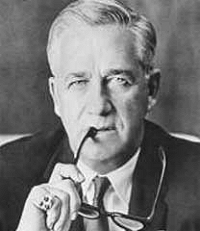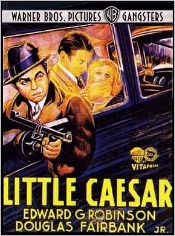 Born in San Francisco on October 15, 1900, Mervyn LeRoy was a prolific, mainstream Hollywood filmmaker who, while lacking the stylistic individualism that stamped the works of his more talented brethren, had an intuitive, almost uncanny grasp of what constituted successful screen entertainment. As a youngster he sang on the stage and impersonated Charlie Chaplin to impressed audiences. Drifting south from San Francisco, he played bit parts in "Bronco Billy" Anderson's short Westerns before landing a lab job through the courtesy of his cousin, producer Jesse Lasky.
Born in San Francisco on October 15, 1900, Mervyn LeRoy was a prolific, mainstream Hollywood filmmaker who, while lacking the stylistic individualism that stamped the works of his more talented brethren, had an intuitive, almost uncanny grasp of what constituted successful screen entertainment. As a youngster he sang on the stage and impersonated Charlie Chaplin to impressed audiences. Drifting south from San Francisco, he played bit parts in "Bronco Billy" Anderson's short Westerns before landing a lab job through the courtesy of his cousin, producer Jesse Lasky.
LeRoy toiled in many odd jobs around the Famous Players-Lasky studio, performing in the films Double Speed (1920), The Ghost Breaker (1922), and Broadway After Dark (1924), among others. He moved to First National and took up comedy writing, contributing gags and titles to Sally (1925), Irene, Ella Cinders (both 1926), and Orchids and Ermine (1927), among others. That same year, the ambitious and aggressive LeRoy wrangled a directorial assignment, on No Place to Go, and ingratiated himself with the studio brass, which included the brothers Warner, who'd recently purchased the company and merged it with their own.
He helmed several light, breezy jazz-age concoctions--including Harold Teen (1928), Little Johnny Jones (1929), and Show Girl in Hollywood (1930)--before scoring his first major success directing Edward G. Robinson in the seminal gangster thriller Little Caesar (1930). He alternated musicals and comedies with grimmer fare throughout the remainder of his Warner Bros.-First National tenure, and his list of directorial credits is, in the main, impressive. Broad-Minded (1931), I Am a Fugitive From a Chain Gang (1932) with Paul Muni, Hard To Handle (1933), Heat Lightning (1934), Anthony Adverse (1936), and They Won't Forget (1937) are among his better efforts.
 LeRoy left Warners in 1938 and signed with MGM as a producer, overseeing The Wizard of Oz and The Marx Brothers' At the Circus in 1939, among others, before returning to directing with the 1940 remake of Waterloo Bridge. LeRoy's subsequent Metro films, all of them glossy, well-produced products in the studio's established tradition, include Johnny Eager (1941), Random Harvest (1942; Oscar-nominated for Best Director), Thirty Seconds Over Tokyo (1944), Homecoming (1948), and East Side, West Side (1949).
LeRoy left Warners in 1938 and signed with MGM as a producer, overseeing The Wizard of Oz and The Marx Brothers' At the Circus in 1939, among others, before returning to directing with the 1940 remake of Waterloo Bridge. LeRoy's subsequent Metro films, all of them glossy, well-produced products in the studio's established tradition, include Johnny Eager (1941), Random Harvest (1942; Oscar-nominated for Best Director), Thirty Seconds Over Tokyo (1944), Homecoming (1948), and East Side, West Side (1949).
After taking over the epic Quo Vadis? (1951) from John Huston, LeRoy shifted his attention to musicals, helming Lovely to Look At (1952), Latin Lovers (1953), and Rose Marie (1954) in his typically invisible style. He then returned to Warners, replacing John Ford on Mister Roberts (1955), and subsequently directing The Bad Seed (1956), No Time for Sergeants (1958), The FBI Story (1959), Gypsy (1962), and Mary, Mary (1963). He went to other studios to make The Devil at Four O'Clock and A Majority of One (both 1961), and his final film Moment to Moment (1966).
One of Hollywood's authentic elder statesmen (and biggest boosters) in later years, LeRoy tried to soft-pedal the hard edge he brought to his 1930s Warners films and claimed that all he'd ever done was try to please an audience. LeRoy retired (save some uncredited help on 1968's The Green Berets) and wrote his autobiography, Take One, in 1974. LeRoy died on September 13, 1987.
--LEONARD MALTIN, from
Leonard Maltin's Movie Encyclopedia.